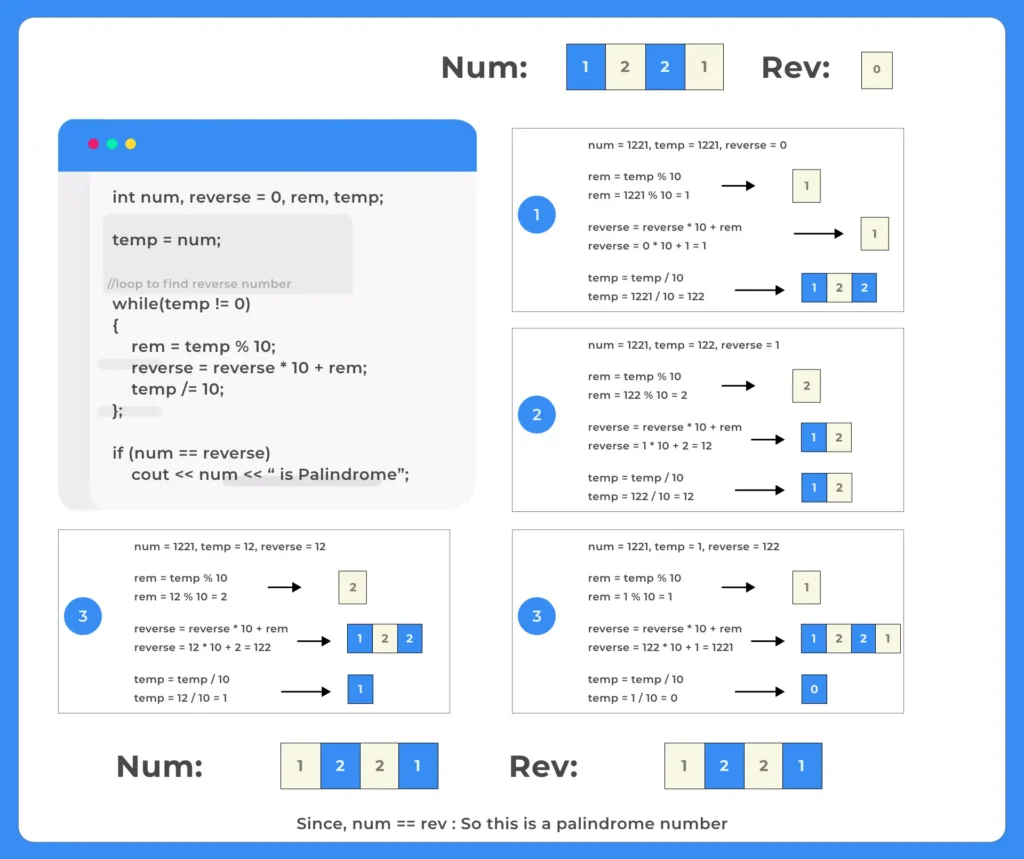Palindrome Program in C++
Palindrome or not
A number is a Palindrome number if the reverse of the number and the numbers itself are equal i.e. if the number and its reverse are the same then a number is a palindrome number.
Example : Number : 12321 Reverse : 12321 Both number & reverse are equal so palindrome number.

Methods Discussed
- Method 1: Mathematical approach
- Method 2: Recursive Mathematical approach
Other methods for C++
- Method 3: String approach using for loop
- Method 4: String approach using updated for loop
- Method 5: String approach using Binary search style while loop
Method 1 Algorithm:-
For a user input num, create variables reverse = 0, rem, temp
- Assign reverse = num
- Extract last digit of temp as ‘rem’
- Construct reverse as reverse = reverse * 10 + rem
- Reduce length of temp as temp = temp / 10
- Keep doing until temp becomes 0
- If num == reverse
- Print palindrome else print its not

Method 1
Code
//C++ Program to check whether a number is palindrome or not
#include <iostream>
using namespace std;
//main program
int main ()
{
//variables initialization
int num, reverse = 0, rem, temp;
num=12321;
cout <<"\nThe number is: "<<num;
temp = num;
//loop to find reverse number
while(temp != 0)
{
rem = temp % 10;
reverse = reverse * 10 + rem;
temp /= 10;
};
// palindrome if num and reverse are equal
if (num == reverse)
cout << num << " is Palindrome";
else
cout << num << " is not a Palindrome";
}
// Time Complexity : O(N)
// Space Complexity : O(1)
// where N is the number of digits in num
Output
The number is: 12321
12321 is Palindrome
Method 2
This method uses recursion in C++
Code
#include<iostream>
using namespace std;
// Recursive way to find reverse of a number
int getReverse(int num, int rev){
if(num == 0)
return rev;
int rem = num % 10;
rev = rev * 10 + rem;
return getReverse(num / 10, rev);
}
//main program
int main ()
{
int num, reverse = 0;
num=123454321;
cout <<"\nThe number is: "<<num;
// palindrome if num and reverse are equal
if (getReverse(num, reverse) == num)
cout << num << " is Palindrome";
else
cout << num << " is not a Palindrome";
}
// Time Complexity : O(N)
// Space Complexity : O(1)
// where N is the number of digits in num
// Auxilliary Space Complexity : O(N)
// Due to function call stack
Output
The number is: 123454321
123454321 is Palindrome
String Based Methods
String-based methods are discussed below-
Method 3
- For a String of Length: Len
- Run an iterative loop in an iteration of i
- If encounter any index such that string[i] != string[len – i -1], then the string is not palindrome
- Otherwise if no condition such found in the whole iteration in the loop then string is a palindrome
Run
#include <iostream>
#include <string.h>
using namespace std;
int main()
{
char string[10] = "radar";
int i, len;
bool flag = false;
len = strlen(string);
for (i = 0; i < len; i++)
{
// Checking if string is palindrome or not
if (string[i] != string[len - i - 1]) {
flag = true;
break;
}
}
if (flag)
cout << string << " is not palindrome";
else
cout << string << " is palindrome";
return 0;
}Output
radar is palindrome
Method 4
This method is the same as the above method with two minor differences –
Difference 1
- For loop runs only till len/2 not the whole length of the string
- Since the other half, the string will be the same as the first half. If the string is a palindrome
Difference 2
- We also handle capitalization
- The previous method would have said “Radar” is not palindrome as R is not equal to r
- This method converts the whole string into lowercase and thus will say that “Naman” is palindrome
Run
#include <iostream>
#include <string.h>
using namespace std;
void lowerCase(char str[]){
int i = 0;
while (str[i] != '\0')
{
if (str[i] > 64 && str[i] < 91)
str[i] += 32;
i++;
}
}
int main()
{
char string[10] = "Radar";
int i, len, flag = 0;
lowerCase(string);
len = strlen(string);
// only need to check till half of the array
for (i = 0; i < len / 2; i++)
{
// Checking if string is palindrome or not.
if (string[i] != string[len - i - 1]){
flag++;
break;
}
}
if (flag)
cout << string << " is not palindrome";
else
cout << string << " is palindrome";
return 0;
}
Output
radar is palindrome
Method 5
This method is the same as the above method. However, instead of for loop, we use a whole loop.
The approach is very similar to Binary search looping
Run
#include <iostream>
#include <string.h>
using namespace std;
void Lower_case(char str[]) {
int i = 0;
while (str[i] != '\0') {
if (str[i] > 64 && str[i] < 91) str[i] += 32;
i++;
}
}
void CheckPalindrome(char string[])
{
// to mark left most and right most indexes of string
int left = 0;
int right = strlen(string) - 1;
// Keep comparing characters while they are same
// until left and right overlap one another
// inspiration for this approach taken from binary search
while (right > left)
{
if (string[left++] != string[right--]) {
cout << string << " is not palindrome";
return;
}
}
cout << string << " is palindrome";
}
int main()
{
char str1[50] = "Radar";
Lower_case(str1);
CheckPalindrome(str1);
return 0;
}
Output
radar is palindrome
Prime Course Trailer
Related Banners
Get PrepInsta Prime & get Access to all 200+ courses offered by PrepInsta in One Subscription
- Positive or Negative number: C | C++ | Java | Python
- Even or Odd number: C | C++ | Java | Python
- Sum of First N Natural numbers: C | C++ | Java | Python
- Sum of N natural numbers: C | C++ | Java | Python
- Sum of numbers in a given range: C | C++ | Java | Python
- Greatest of two numbers: C | C++ | Java | Python
- Greatest of the Three numbers: C | C++ | Java | Python
- Leap year or not: C | C++ | Java | Python
- Prime number: C | C++ | Java | Python
- Prime number within a given range: C | C++ | Java | Python
- Sum of digits of a number: C | C++ | Java | Python
- Reverse of a number : C | C++ | Java | Python
- Palindrome number: C | C++ | Java | Python
- Armstrong number : C | C++ | Java | Python
- Armstrong number in a given range : C | C++ | Java | Python
- Fibonacci Series upto nth term : C | C++ | Java | Python
- Find the Nth Term of the Fibonacci Series : C | C++ | Java | Python
- Factorial of a number : C | C++ | Java | Python
- Power of a number : C | C++ | Java | Python
- Factor of a number : C | C++ | Java | Python
- Strong number : C | C++ | Java | Python
- Perfect number : C | C++ | Java | Python
- Automorphic number : C | C++ | Java | Python
- Harshad number : C | C++ | Java | Python
- Abundant number : C| C++ | Java | Python
- Friendly pair : C | C++ | Java | Python






Login/Signup to comment